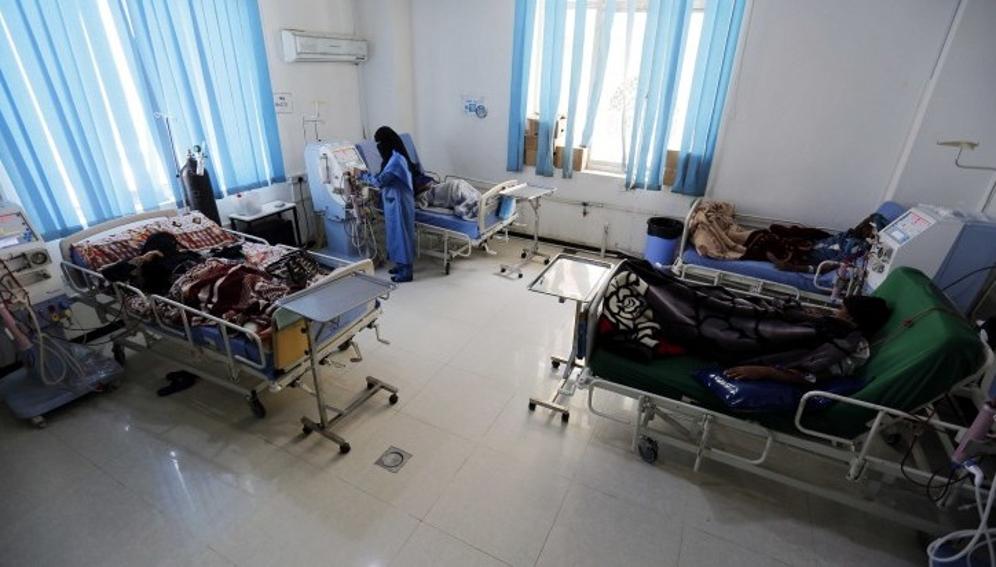By: Hanan Balkhy
Send to a friend
The details you provide on this page will not be used to send unsolicited email, and will not be sold to a 3rd party. See privacy policy.
Cholera, caused by Vibrio cholerae, spreads through contaminated water and thrives where sanitation systems have collapsed. Once inside the body, it dehydrates victims within hours, but with prompt treatment, nearly every life can be saved.
The science is clear; the solutions are available. Yet across the Eastern Mediterranean, the disease continues to spread because the systems that prevent it—water networks, laboratories and health services—have been shattered by years of conflict and neglect.
In 2024, 560,823 cholera cases and 6,028 deaths were reported to the World Health Organization (WHO)—a 5 per cent rise in infections and a 50 per cent rise in deaths from the previous year.
Sixty countries recorded cases, with outbreaks expanding across Africa, the Middle East and Asia, which together accounted for 98 per cent of the global burden. High infection rates in Somalia, Sudan, and Yemen reflect the disease’s deep entrenchment in fragile settings.
Sudan crisis
Sudan epitomises how conflict, climate and infrastructure collapse combine to fuel transmission. This year, cholera has spread across 40 localities in all five states of Darfur, infecting over 18,000 people. Nationwide, over 123,000 cases and 3,494 deaths have been reported since mid-2024—the country’s longest recorded outbreak.
After two years of war, hospitals have been destroyed, water systems lie in ruins, and millions rely on unsafe sources for drinking and washing. Floods have further contaminated water sources, creating ideal conditions for bacteria to thrive.
In September, a large-scale oral cholera vaccination campaign was launched in Darfur, protecting 1.6 million people. Despite huge logistical barriers, the effort shows that when partners coordinate effectively, health action can succeed—even in conflict.
Resurging threat
Across the Eastern Mediterranean region, cholera is resurging. The region―home to less than 10 per cent of the world’s population―now bears 74 per cent of the global burden of cholera cases.
Yemen alone accounted for 89 per cent of cases and 96 per cent of deaths in the Middle East and Asia in 2024. Somalia and Sudan also recorded surges.
These figures reveal systemic breakdown. Behind every number lies a failure of infrastructure and access. One quarter of cholera deaths now occur outside health facilities, as people die before reaching care.
Climate change compounds the crisis. Floods, droughts and rapid urbanisation are altering water systems, while dense informal settlements provide fertile ground for outbreaks.
Vaccine stockpile
Scientific advances offer a path forward. In early 2024, WHO prequalified a new simplified oral cholera vaccine (OCV), Euvichol-S, which entered the global stockpile later that year. This helped maintain OCV stockpile levels above five million doses for the first half of 2025, amid global shortages.
Still, demand outpaces supply. In 2025, 65 million doses were requested globally, but only 45 million were approved for emergency use. The world continues to rely on a single-dose regimen, which offers shorter protection but wider coverage.
Most cholera cases occur in low-income or crisis-affected countries, yet vaccine production remains concentrated elsewhere. Expanding regional manufacturing capacity could strengthen self-sufficiency and reduce dependence on scarce global stockpiles.
Resilient systems
For decades, cholera control has been reactive, mobilising only after outbreaks explode. To break this cycle, countries must shift from crisis response to resilient prevention systems.
That means integrating cholera work into broader water, sanitation and hygiene (WASH) programmes; strengthening laboratory surveillance, and training health workers for early detection and rapid response.
The WHO’s Global Roadmap to End Cholera by 2030 aims for a 90 per cent reduction in deaths through multisectoral national plans. For the Eastern Mediterranean, this means linking cholera control with climate adaptation, urban planning and primary health care reforms.
Clean water and waste management should be treated as essential health interventions, not development add-ons.
Children remain the most vulnerable. In 2024, under-fives accounted for one in five cholera cases globally, reflecting both high exposure and malnutrition. In conflict settings like Yemen and Sudan, improving nutrition and vaccination coverage could dramatically lower child mortality from waterborne diseases.
Regional collaboration
Cholera, like most pathogens, does not respect borders. Fragmented national responses cannot contain what is essentially a regional problem. Countries in the Eastern Mediterranean could strengthen control through shared early-warning systems, cross-border logistics, and pooled emergency stockpiles.
Local universities and research institutes also have a critical role. Expanding laboratory networks, deploying rapid diagnostic tests, and using genomic surveillance can provide real-time data to trace transmission and guide interventions.
At the community level, prevention depends on trust and behaviour. Simple practices such as safe water storage, hand hygiene, and early care-seeking can halt transmission when supported by accurate, locally led communication.
Prevention politics
Ending cholera is as much a political challenge as a scientific one. The disease persists not because it is unstoppable, but because prevention has been deprioritised. It is cheaper to secure clean water than to mount emergency responses, yet water and sanitation remain among the most chronically underfunded sectors in humanitarian aid.
For the Eastern Mediterranean, tackling cholera offers an opportunity to show that evidence-based cooperation can deliver results even amid crisis. Eliminating the disease would save lives, restore confidence in public health institutions and demonstrate that resilience can be built from the ground up.
This piece was produced by SciDev.Net’s Middle East and North Africa desk.



